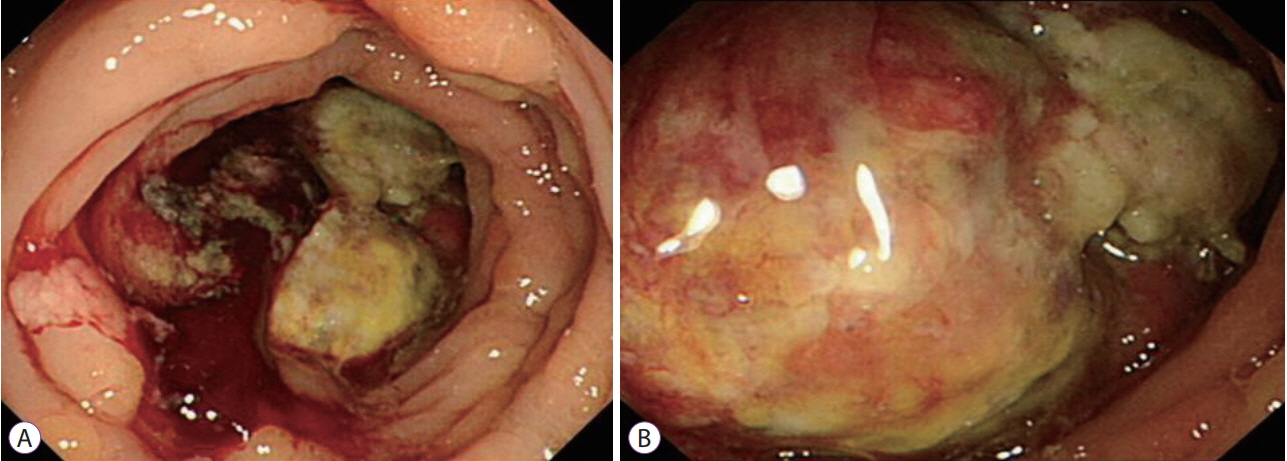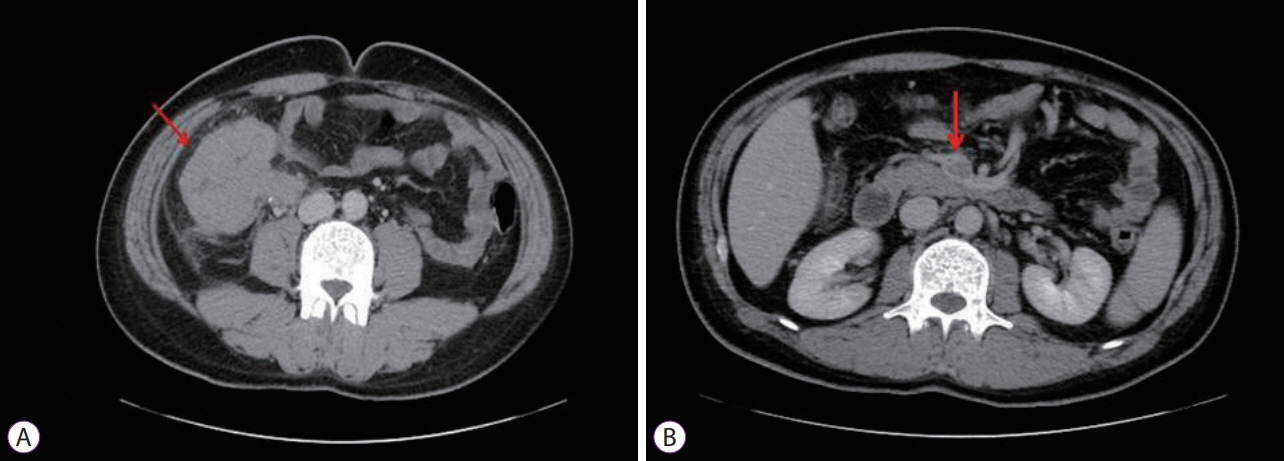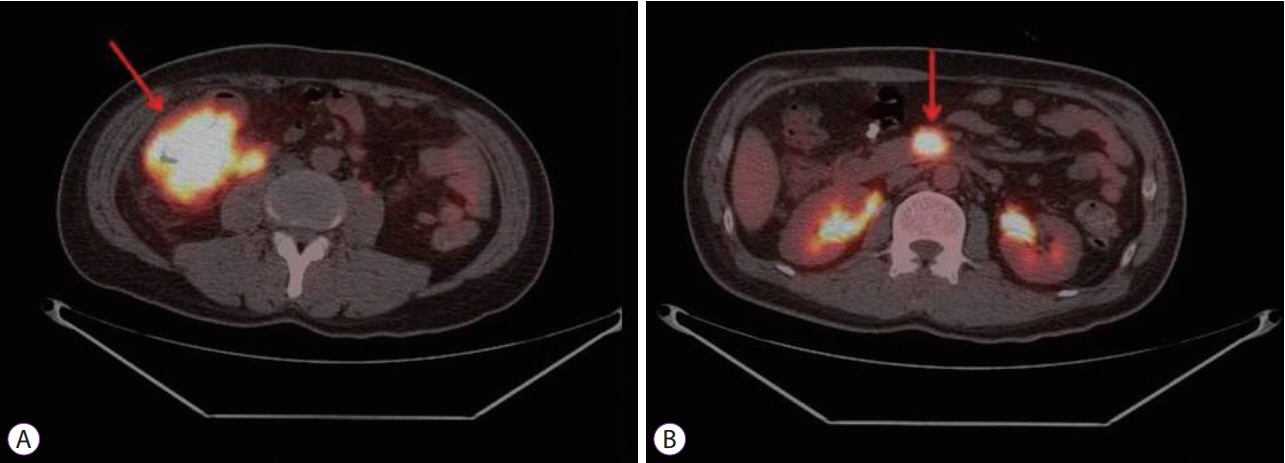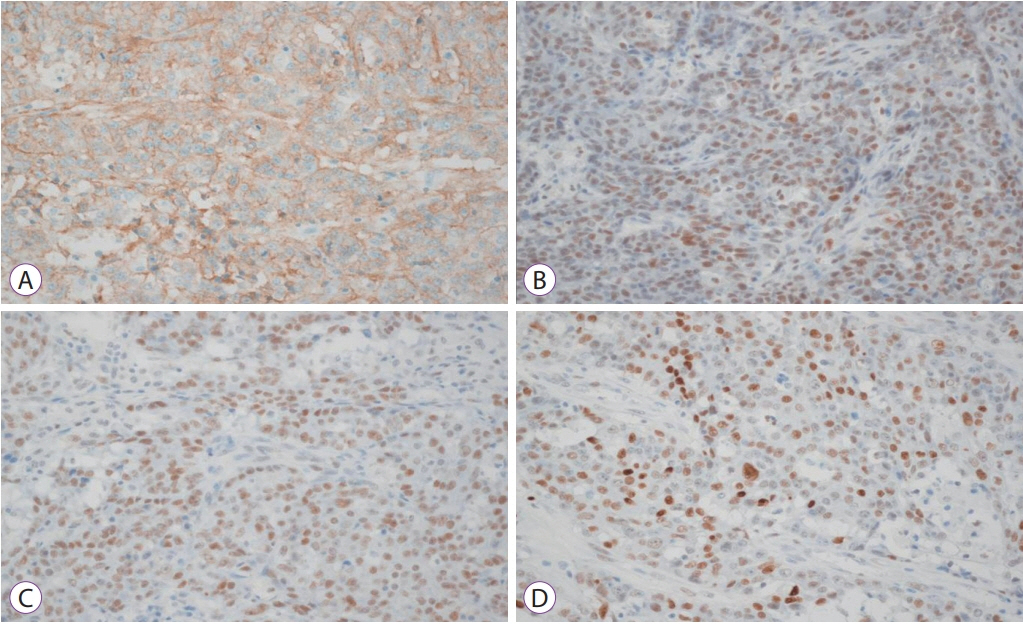Clin Endosc.
2019 Sep;52(5):506-509. 10.5946/ce.2018.135.
Ascending Colon Cancer with Pathologically Confirmed Tumor Thrombosis of Superior Mesenteric Vein: A Case Report
- Affiliations
-
- 1Department of Internal Medicine, Gangneung Asan Hospital, University of Ulsan College of Medicine, Gangneung, Korea. sangjin@gnah.co.kr
- 2Department of Surgery, Gangneung Asan Hospital, University of Ulsan College of Medicine, Gangneung, Korea.
- 3Department of Internal Medicine, Suncheon Hospital, Suncheon, Korea.
- KMID: 2464674
- DOI: http://doi.org/10.5946/ce.2018.135
Abstract
- Colon cancer is very rarely accompanied by tumor thrombosis of the superior mesenteric vein (SMV). A 46-year-old patient had been diagnosed with SMV tumor thrombosis related to colon cancer without hepatic metastasis and underwent right hemicolectomy with SMV tumor thrombectomy. Tumor thrombosis was pathologically confirmed as metastatic colon cancer. There has been no recurrence for 12 months with 12 cycles of adjuvant-chemotherapy.
MeSH Terms
Figure
Reference
-
1. Jemal A, Siegel R, Ward E, Hao Y, Xu J, Thun MJ. Cancer statistics, 2009. CA Cancer J Clin. 2009; 59:225–249.
Article2. Radecka E, Brekkan E, Juhlin C, Nilsson L, Sundin A, Magnusson A. An unusual case of tumor thrombus in the inferior vena cava. A case report. Acta Radiol. 2003; 44:160–161.
Article3. Tanaka A, Takeda R, Mukaihara S, et al. Tumor thrombi in the portal vein system originating from gastrointestinal tract cancer. J Gastroenterol. 2002; 37:220–228.
Article4. Subramanyam BR, Balthazar EJ, Lefleur RS, Horii SC, Hulnick DH. Portal venous thrombosis: correlative analysis of sonography, CT and angiography. Am J Gastroenterol. 1984; 79:773–776.5. Nguyen BD. Positron emission tomography imaging of renal vein and inferior vena cava tumor thrombus from renal cell carcinoma. Clin Nucl Med. 2005; 30:107–109.
Article6. McLoughlin JM, Jensen EH, Malafa M. Resection of colorectal liver metastases: current perspectives. Cancer Control. 2006; 13:32–41.
Article7. Tada K, Kokudo N, Seki M, et al. Hepatic resection for colorectal metastasis with macroscopic tumor thrombus in the portal vein. World J Surg. 2003; 27:299–303.
Article8. Kaida H, Ishibashi M, Kurata S, Uchida M, Hayabuchi N. Tumor thrombus in the inferior vena cava from colon cancer detected by 18F-FDG-PET. Ann Nucl Med. 2007; 21:185–188.
Article9. Otani K, Ishihara S, Hata K, et al. Colorectal cancer with venous tumor thrombosis. Asian J Surg. 2018; 41:197–202.
Article
- Full Text Links
- Actions
-
Cited
- CITED
-
- Close
- Share
- Similar articles
-
- A case report of suprerior mesenteric vein thrombosis associated with diverticulitis
- Acute Appendicitis with Superior Mesenteric Vein Thrombosis and Portal Vein Thrombosis
- Spontaneous Dissolution of Isolated Superior Mesenteric Vein Thrombosis in Acute Pancreatitis
- A Case of Ulcerative Colitis Associated with Portal Vein and Superior Mesenteric Vein Terombosis
- A Case of Inferior Mesenteric Arterial Thrombosis with Bowel Infarction Successfully Treated by Conservative Treatment






